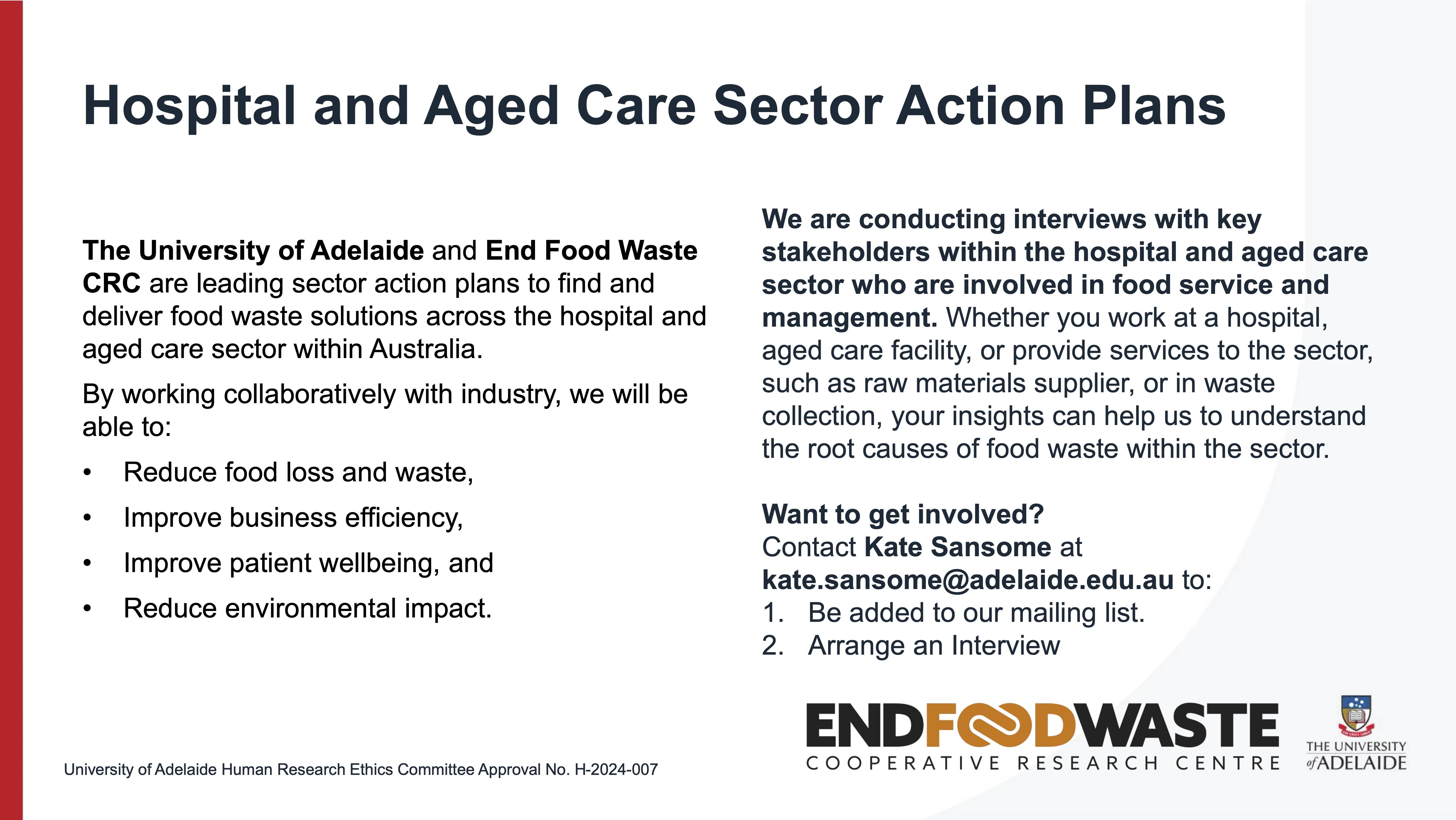Hospital and Aged Care Sector Action Plan
The primary goal of Hospital and Aged Care Sector Action Plan is to reduce food loss and waste in the hospitals and aged care sector, thereby increasing profitability, reducing environmental impact and improving nutritional outcomes for patients and residents.
More than 251,000 tonnes of food are wasted in institutions per annum, representing 3.5% of all food waste in Australia (FIAL, 2021). Institutions are organisations where food is not the primary reason why consumers are attending the venue, for example hospitals and aged care facilities. Food is often managed ‘at cost’ with wastage often occurring due to large-scale production and mass consumption of food within and across institutions (Canali et al., 2016). In hospitals, for example, up to 50% of total waste comes from food (Alam et al., 2008; Mattoso & Schalch, 2001; Anari et al., 2023).
Food wasted in hospitals and aged care facilities represents both environmental and economic losses (Saber et al. 2022), and potential nutritional deficiencies for patients and residents (Simzari et al. 2017). Hospitals and aged care food services are in a unique position to contribute to health care sustainability efforts by preventing, reducing, and managing food waste.
Researchers from The University of Adelaide are working alongside End Food Waste Australia and key stakeholders within the hospital and aged care sector to identify opportunities to reduce food loss and waste within the sector. The hospital and aged care sector action plan will be co-designed with key stakeholders who are most able to directly control or influence the root cause(s) of food waste hotspots and to take action to prevent, reduce, or manage food waste in the value chain. This project aims to identify and develop solutions for the hospital and aged care sectors, recognising the unique operational challenges of these sectors.
OUR PLAN
The primary goal of this project is to reduce food loss and waste in the Institutions sector, thereby increasing profitability and reducing environmental impact.
Planned activities: This project will run from January 2024 to January 2025.
Stakeholder Interviews: February to June 2024
We are conducting 30-to-60-minute interviews with key stakeholders within the hospital and aged care sector, such as food service directions, food service managers, kitchen hands, chefs etc. Individuals who are involved in food service as their roles often have significant food ordering, preparation and menu planning, which can contribute to our understanding of food waste management. We are interested in speaking to those who provide services to the sector, such as food service contractors, raw materials supplier and waste collection.
Stakeholder Workshops: August to October 2024
We will be conducting two-phases of stakeholder workshops (approx. 1.5-3hrs) to identify root causes and co-design solutions of food waste within the sector. Participants can either attend one workshop or both.
- Workshop One: Root cause analysis workshop to share observations, review findings and identify root causes of food waste with an initial idea generation session to reduce food waste.
- Workshop Two: A final solutions workshop with an expanded idea generation session and prioritise solutions to inform the recommendations.
Participants have the option to engage in either one or all research activities and multiple individuals from the same organisation are welcome to participate.
Anticipated outcomes:
Participants will receive copies of the final Hospital and Aged Care Sector Action Plan, inclusive of sector-wide recommendations for trial and suggested implementation mechanisms. This will empower you to enact effective food waste reduction measures. Reducing food waste and its environmental impacts offers the sector cost savings while enhancing health and wellbeing through addressing nutritional deficiencies.
Project team:
Professor Jodie Conduit, The University of Adelaide.
Dr Taylor Willmott, The University of Adelaide., The University of Adelaide.
Dr Kate Sansome, The University of Adelaide.
Dr Jonathan Baker, The University of Adelaide.
Professor Ingo Karpen, Karlstad University/The University of Adelaide.

